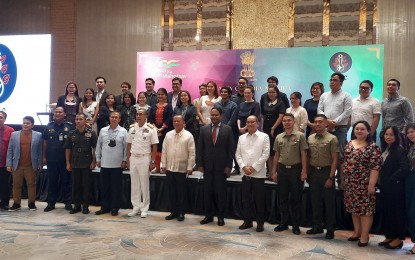
ITEC RECEPTION DAY. The ITEC Philippines alumni pose during the ITEC Day reception in Taguig City on Tuesday (March 29, 2022) night. Gracing the event were TESDA chief Secretary Isidro Lapeña and Commodore Donn Anthony Miraflor (7th and 6th from left, respectively, front row). (PNA photo)
MANILA – The Indian government is opening 50 defense training slots for the Philippines in 2023 under its flagship development initiative, the Indian Technical and Economic Cooperation (ITEC) program.
Indian Ambassador to the Philippines Shambhu Kumaran said Tuesday night the allocated slots for the Philippines would be the highest in Southeast Asia, reflecting the two nations' growing partnership on capacity building.
Over the past five years alone, a total of 87 Filipino defense personnel were trained in India in various fields, including security and strategic studies, defense management, logistics and management, and engineering.
At present, Manila and New Delhi's cooperation on defense training is "bidirectional," with defense personnel from both nations attending each other's flagship training courses.
Recently, two Indian military officers participated in the Armed Forces of the Philippines' (AFP) General Staff Command Course.
"India’s approach to development partnership is based on the principles of equity and mutual respect. It is shaped by our belief that strengthening and augmenting national capacities are essential for bringing progress and prosperity to our people," Kumaran said during the ITEC Day reception in Taguig City. "Our capacity-building initiatives with partner countries stem from the spirit of solidarity to enhance mutual learning for shared and sustainable growth."
Commodore Donn Anthony Miraflor, AFP Deputy Chief of Staff for Education, Training, and Doctrine, said the India-funded courses significantly complement the AFP's competency-building programs and would positively help produce more well-rounded leaders in the organization.
"In light of the volatility of our domestic and internal security environments, our mutual training and capacity-building cooperation are truly vital in ensuring that both our defense forces are capable to respond to any security threat, and other exigencies under all circumstances. After all, peace and progress is the concern of every nation, across all regions," he said, reading the message of AFP Chief of Staff Lt. Gen. Andres Centino.
Defense, albeit one of its most important segments, is only one part of the ITEC program.
More than 1,000 Filipino public servants have also concluded their ITEC training programs in a range of disciplines, such as IT, rural development, parliamentary and electoral practices, renewable energy, health care, engineering, and entrepreneurship, according to the Indian Embassy.
Making leaders
Guia Roa Dionido, a division head at the Philippine Trade Training Center and an ITEC program alumna, said the Indian initiative is one of the main reasons she is the kind of leader she is today.
"The ITEC training helped me to be the woman who made a change from a staff merely implementing training programs assisting resource persons. Now, I am tasked to be the officer in charge of our division who leads the whole team. The learning and experience I got from ITEC training contributed to the kind of leader I am today," she said.
Dionido attended two ITEC programs in 2016 and in 2021, one of which was focused on trade and sustainable development.
Danielle Javier of the Asian Development Bank, on the other hand, said her experience at the National Institute for Micro, Small and Medium Enterprises (NI-MSMEs) in 2018 through ITEC allowed her to see how government support in women empowerment could go a long way.
During a visit to a rural part of Bangalore, Javier saw how the land was subsidized as green industrial estates so that women-led MSMEs can build their respective offices and factories.
"Imagine that the land was subsidized to these women-owned enterprises, 200 acres of land for hundreds of businesses were allotted, creating thousands of employment for Indian people," she said.
"From that initiative, we were able to see that women are not just limited to be housewives or to just stay at home, they can use their skills to create businesses and to further their area, because as long as the business is thriving, the area would thrive as well."
The ITEC was launched in 1964 and has since reached more than 200,000 participants from 160 partner countries.
On top of the short- and long-term training courses, the initiative also covers exchanges of best practices and sharing of experience through projects, consultancy, feasibility studies, visits to partner countries, and disaster relief. (PNA)
